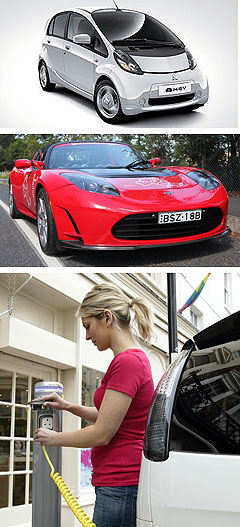Make / Model Search
News - General News - Electric VehiclesEV success hinges on fuel prices: reportTipping point: New research shows that fuel prices need to reach about $2 a litre before a majority of Australians will consider buying or leasing an EV. Deloitte study points to long road ahead before Australians switch to EVs en masse7 Jul 2011 By TERRY MARTIN AS DEBATE rages over the federal government’s decision to exclude fuel from its carbon tax scheme, which Greens leader Bob Brown and others argue will impede the take-up of electric vehicles, new research shows that fuel prices need to reach about $2 a litre before a majority of Australians will consider buying or leasing an EV. In an Australian-specific survey that forms part of a global study titled ‘Gaining traction: Will consumers ride the electric vehicle wave?’, consulting firm Deloitte also found that pump prices need to hit $2.60 a litre before the vast majority of consumers (71 per cent) would be more willing to consider an EV over a regular car. Moreover, Deloitte found that a majority of individuals (54 per cent) would be much less likely to consider an EV if a conventional-engine model of their choice averaged 4.7L/100km in fuel consumption, while 76 per cent said they would be less interested in EVs if economy from their preferred internal combustion engine (ICE) vehicle was 3.0L/100km. The results reinforce conclusions made from equivalent surveys in other countries that fuel prices and ongoing improvements to the traditional ICE will have a significant impact on EV adoption.  Green times: Mitsubishi i-MiEV, Tesla Roadster, a recharge point. Green times: Mitsubishi i-MiEV, Tesla Roadster, a recharge point.The findings also show that consumer expectations of EVs in terms of pricing, driving range and battery recharging times far exceed the first wave of EVs now available – or soon to be launched – including the Mitsubishi i-MiEV, Nissan Leaf and Renault Fluence ZE. The Australian study, which was conducted in May and surveyed 509 adults who hold a driver’s licence, found that most respondents saw EVs as better than ICEs in terms of their impact on the environment (80 per cent) and fuel efficiency/recharging costs (58 per cent). However, ICEs were seen as preferable over electric cars in terms of driving range (66 per cent), convenience to refuel/recharge (60 per cent) and purchase price (56 per cent). A large proportion expects a range of up to 320km (68 per cent), a majority expects a charging time of two hours or less (58 per cent) and, with concerns over the widespread availability of public charging stations, the vast majority rates the ability to charge from home as extremely or very important (91 per cent). Deloitte automotive and manufacturing partner Damon Cantwell said “the results highlight that until electric vehicles address issues around charge convenience, range and vehicle cost, consumers will continue to focus more on (conventional) small to mid-size cars”. While only 13 per cent of respondents saw themselves as ‘potential first movers’ in the adoption of EVs, Deloitte says it expects an even smaller subset to actually become ‘early adopters’ based on “a mismatch of their expectations regarding EV range, time to charge and costs”. Longer-term, Deloitte expects mass adoption to come from ‘potential first movers’ and those Australians who said they ‘might’ be willing to consider an EV (46 per cent), who were slightly ahead in numbers of those who said they were not likely to consider an EV (41 per cent). Yet of those who indicated they ‘might be willing’ to consider an EV, more than three-quarters (76 per cent) said they expect to pay less than $30,000 after (currently non-existent) government incentives, and two-thirds (66 per cent) expect to pay the same or less for an EV compared to an equivalent conventional-engine model. Another seven per cent said they were only prepared to pay up to a $500 price premium. According to Deloitte, the study’s findings that mass adoption of EVs in Australia is likely to be “some way off” should come as little comfort for local large-car manufacturers, especially considering consumers’ strong preferences for more fuel-efficient vehicles. “The fact that Australian consumers are suggesting that ICEs need to achieve fuel economy levels of 4.7 litres per 100km to detract them from considering an EV purchase, highlights the weight that fuel economy plays in purchase decisions,” Mr Cantwell said. “The survival of the Australian industry, and badly needed increases in volumes manufactured, will continue to be driven by the introduction of a broader model portfolio in the locally produced market.”  Read more20th of June 2011  Renault Australia plugs inRevolutionary Renault Fluence ZE – and its swappable battery – on sale here in 201220th of June 2011  EVs fall short of consumer expectations: DeloitteGlobal survey finds most consumers are not warming to the EV movement17th of June 2011  Smooth sailing for Aussie Leaf launchNissan Australia confirms April launch and no local castings plant delay for Leaf EV16th of June 2011  Mitsubishi announces $48,800 i-MiEV priceAustralia’s first mass-market EV to cost less than $49K as Mitsu sets i-MiEV price |
Click to shareGeneral News articlesResearch General News Motor industry news |











Facebook Twitter Instagram